A little chocolate shop, organic vegetables and furniture restoration – entrepreneurship training provides new beginnings in Jordan
Young saplings are growing in plastic mugs planted into plastic tubes. A pump circulates water for 15 minutes once every two hours. Tomatoes, watermelons, cucumbers, peppers, strawberries and flowers are grown on the flat roof. Tarpaulins protect the pots from too much sun.
The rooftop garden is a hydroponics prototype built by Ibrahim Milhem, 45, in Irbid, the third largest city in Jordan.
Ibrahim, who is an engineer, previously worked in fertiliser and cement companies. After he became unemployed, the life of the family with seven children changed and they ended up losing their house.
”I love plants and trees and planting them,” says Ibrahim.
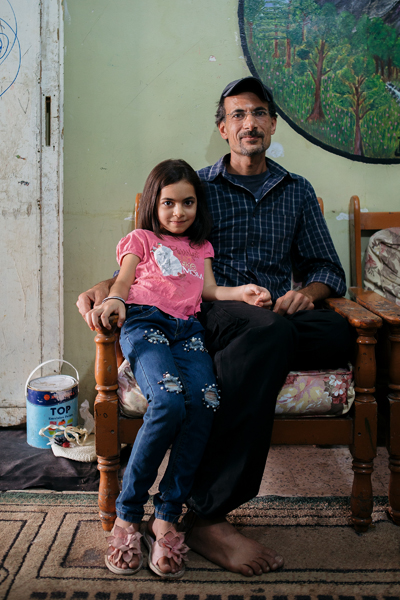
Ibrahim Milhem’s daughter Layal is eager to help her father and follows his activities in the rooftop garden. Photo: Tatu Blomqvist/FCA.
The living room walls in Ibrahim’s brother’s house, which is where the family lives now, are full of paintings made by Ibrahim, who is an avid painter; most depict trees and plants.
However, irrigation is expensive, because there is a water shortage in Jordan.
Ibrahim set about solving the problem and found information about hydroponics online. Around the same time, he heard about the entrepreneurship training organised by Finn Church Aid (FCA). The training helped him hone the idea of a business of his own. In addition, he learned about marketing, of which he had no prior experience.
Hydroponics is brand new in Jordan, but being resourceful, Ibrahim used his brother’s rooftop to build his own prototype that he now plans to develop and expand.
The hydroponic plantation saves about 80 percent water compared to regular growing.
”At first I didn’t believe it, but I gave it a try and it’s true,” says Ibrahim, who is constantly studying more and learning by doing.
His aim is to have a garden producing organic vegetables that welcomes customers to come and pick their own vegetables.
Finnish entrepreneurship training gave encouragement
Jordan has an unemployment rate of over 18 percent, and the number is much higher still for women and young people.
A country with a population of 9.5 million, Jordan has reveiced over a million refugees since 2011. This is the second highest number relative to population after Lebanon. Most have run away from the war that is in its eighth year now in neighbouring Syria.
From 2017 to 2018, FCA cooperated with Mercuria Business College to organise compact entrepreneurship courses to refugees and Jordanians in the most vulnerable positions. After a two-month training period, participants received mentoring and a small start-up grant.
55 people participated in the courses, and so far they have started a total of 49 businesses, some of which already employ others as well. Over half of those who have started businesses are women and ten percent are persons with disability.
Flowers and awareness education
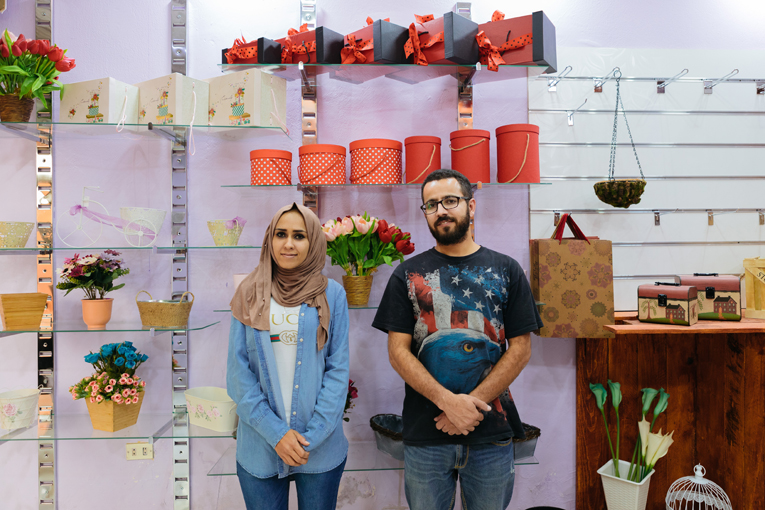
Asma’a (left) and Hussam think that starting a business has not been too difficult. What has preoccupied them the most is how to make interaction with customers work as deaf people. To help with this, they are developing an application using pictures and sign language.
Jordanian friends Asma’a and Hussam, both deaf, attended the entrepreneurship course and learned skills such as marketing, financial planning, and customer service. They are in the process of setting up a flower shop on their block.
We are developing an application that works through a flat-screen television and allows us to communicate with our customers, because there are very few sign language interpreters in Jordan,” says Asma’a.
”At the same time, we can provide awareness education and bring attention to the position of deaf people in society.”
Both Asma’a and Hussam are highly educated. Both have often been invited to job interviews based on their CVs, but being deaf has prevented them from landing the job.
The first flower shop in the neighbourhood has already been beautifully furnished in preparation for the opening a few weeks later. All that remains is the fresh flowers that need to be picked up from the wholesale supplier.
A hobby turned into livelihood
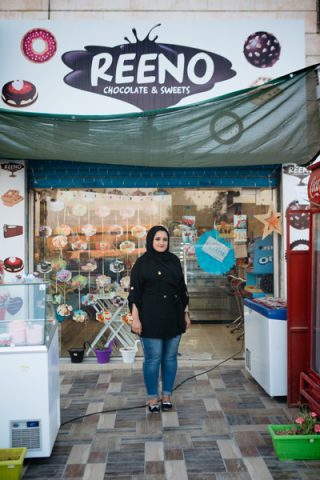
Ranaa Abu Atta founded the Reeno chocholates & sweets after attending Finn Church Aid’s entrepreneurship training. Photo: Tatu Blomqvist/FCA.
Jordanian Rana Abu Atta, 23, is displeased, although without an interpreter, we would not have noticed from all the smiles and laughter. Because of scheduling issues, we have come to see her a day earlier than we originally agreed upon, and she has not had time to fill the display cases with her most intricate chocolates. Even so, the shelves, just like our bellies later on, are full of delicious desserts and sweets piled in front of us for tasting.
Rana was forced to quit her studies in business administration because of her family’s financial difficulties.
She wanted to do something to help her family. Rana decided to start making chocolates. She got the idea from a video she saw on Facebook. It gave her the desire to learn more, and she searched YouTube for more videos.
Although making sweets looked fun, Rana found it is not always easy. She kept trying and published her own video on Facebook featuring sweets she had made. People liked the video, and orders started coming in.
Rana noticed an advertisement for the entrepreneurship training organised by FCA, applied for the course, and got in.
Now Rana has her own shop with one employee. The bank loan for the shop is in the name of her mother, who has supported her daughter in setting up her business. The chocolates and desserts are still made in the home of the family, and she dreams of expanding to bigger premises including a large kitchen.
”Having my own premises has increased people’s trust in my products. They think that if I have the confidence to open my own shop, my products must be good. My income has increased since opening the shop,” says Rana.
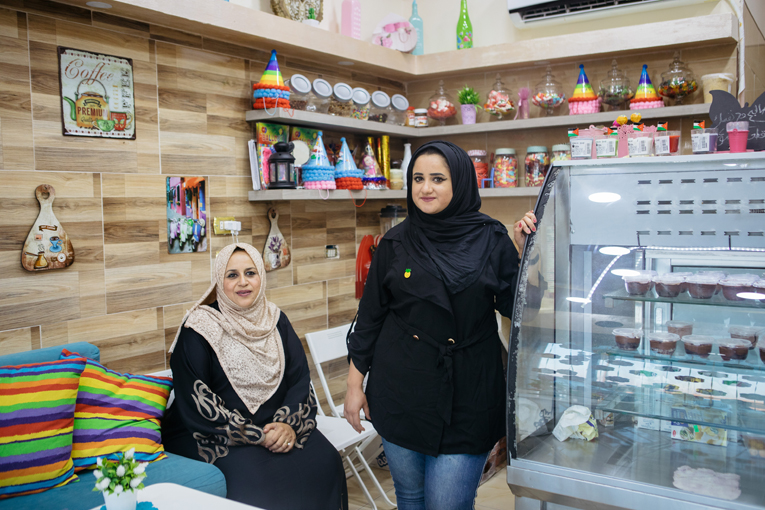
”One of the most beautiful things is my own daughter’s dreams coming true. I’m so proud of her,” says Rana’s mother Amal Fawzi. Photo: Tatu Blomqvist/FCA.
A new beginning in a new country
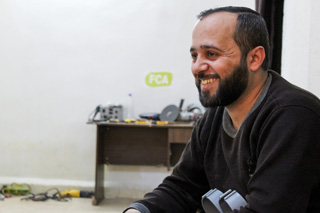
Omar Balkhi provides for his family by manufacturing traditional Syrian furniture and providin furniture restoration and repairing services. Photo: Dana Mufleh /FCA.
Omar Balkhi was wounded in the Syrian war: grenade shrapnel took his legs. The father of two ran with his family from Syria to Jordan. In his new home, Omar fought to find a way to provide for his family.
He wanted to start his own workshop, but he did not know how.
”Now I can run my own business and I have the drive to go on. I can develop my work and get information on my competitors. I’ve learned leadership skills and marketing. Before, I didn’t understand how important these skills are,” says Omar after the FCA training.
In his workshop, Omar plans to sell traditional Syrian wooden furniture that he builds by hand. The business also provides furniture restoration and repair services.
Legislation limits refugees’ entrepreneurship
Refugees and Jordanians attending the course have started joint business ventures.
”It’s good to build a business with a Jordanian partner. Unfortunately, there is no law or official document to corroborate my right to own a business. I’m constantly worried of losing my business”, says one of the Syrian entrepreneurs in the project.
Based on the experiences from the project, Finn Church Aid is cooperating with other international non-governmental organisations, using their influence to create a clear legal framework for joint business ventures in Jordan. This would allow Syrians to work as entrepreneurs with Jordanians as equal partners and to benefit the Jordanian economy.
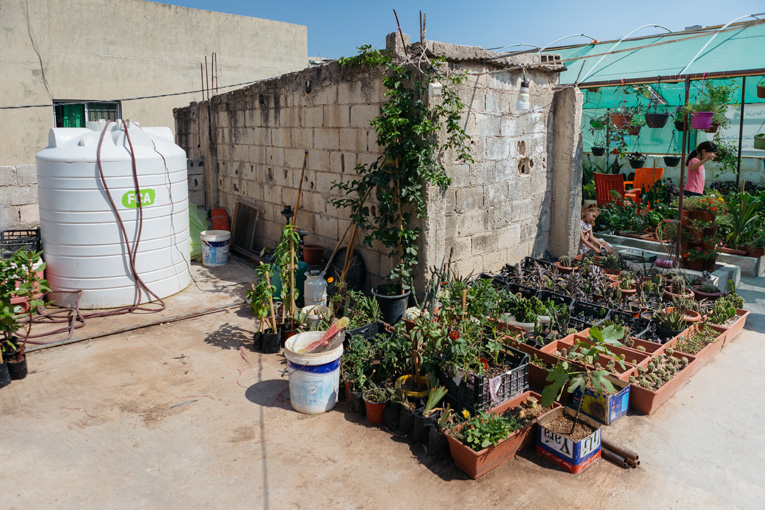
Jordan is one of the driest countries in the world. Both cities and farming are suffering from water shortage. Ibrahim Milhem’s rooftop garden is a little oasis in the city. The kids of the family like to spend time there. Photo: Tatu Blomqvist/FCA.
Text: Minna Elo
Photos: Tatu Blomqvist ja Dana Mufleh.
The project was funded by the European Regional Development and Protection Programme for the Middle East (RDPP), supported by the European Union, the Czech Republic, Denmark, Ireland, the Netherlands, Norway, Switzerland and the United Kingdom.